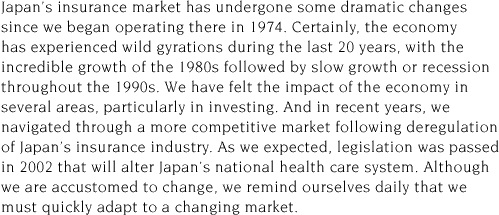|





In responding to the changing marketplace, we have done much more than just survive – we have thrived and maintained our market position as Japan's number one provider of supplemental insurance. In 2002 our sales strongly rebounded from a disappointing 2001. We introduced new products that proved to be extremely popular, and we further expanded our distribution system. And our investment yield continued to be among the highest in the industry. Below are some highlights for the year in yen terms.
Total new annualized premium sales increased 17.9% to ¥108.3 billion, compared with ¥91.9 billion in 2001.
Premium income was ¥797.0 billion, up 5.5% from ¥755.6 billion in 2001.
Total revenues were up 5.6% to ¥956.7 billion, compared with ¥905.7 billion a year ago.
Pretax operating earnings rose 17.4% from ¥100.0 billion to ¥117.4 billion in 2002.


Because a significant portion of our revenues and earnings are derived from Japan, the value of the yen can affect our reported results. However, it's important to point out that we do not actually convert currencies when preparing our financial statements. Rather, we translate yen into dollars using a weighted-average exchange rate for the reporting period. As a result, AFLAC is largely unaffected in economic terms by currency changes, although currency fluctuations can distort our reported results.
AFLAC Japan's growth rates are magnified in dollar terms when the average yen/dollar exchange rate is stronger than in the preceding year. Conversely, when the average yen/dollar exchange rate is weaker, our growth rates in dollar terms are lower than in yen terms. In 2002, the yen averaged ¥125.15 to the dollar, or 2.9% weaker than the average of ¥121.54 in 2001. The weaker yen in 2002 held down our reported results in dollars, which is reflected in the results below.
Total new annualized premium sales increased 14.8% to $867 million, up from $755 million in 2001.
Premium income rose 2.5% to $6.4 billion, up from $6.2 billion in 2001.
Total revenues were up 2.7% to $7.6 billion, compared with $7.5 billion in 2001.
Pretax operating earnings climbed from $823 million to $938 million in 2002, an increase of 13.9%.


|